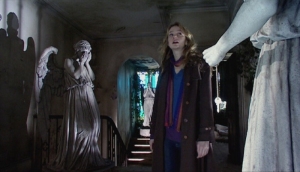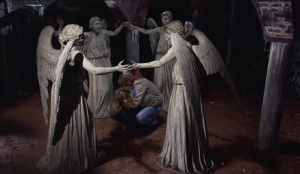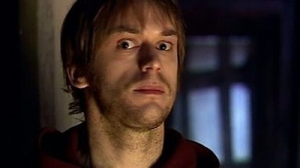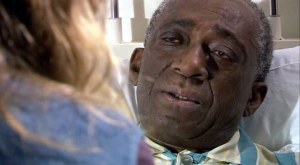On Saturday the 16th of June, 2007, I was over at some friends’ house. They were Doctor Who fans, in a stronger sense than I. I had only been watching the last couple of seasons, casually but with growing interest. As I recall, there were rumours at the time of a particular character returning to the show, so as we sat down to watch Doctor Who that evening, there was an air of anticipation. I’d never watched the programme in a group before then, nor, sadly, since; but there was something special about that night, an excitement in the air that hasn’t been repeated. As Professor Yana looked up from that old pocket watch, into the eyes of his former assistant, and mouthed those four immortal words, a great cheer erupted from the room. It led into the best twist this show has ever thrown out, something it had been saving up for the right moment to have the biggest possible impact. That moment was now, and whether it was the atmosphere of that room or simply a work of great suspense, it left with me an affection for this thing called Doctor Who that I have not felt since. Those four simple words, as delivered superbly by the great Derek Jacobi, were: “I… am… the Master.”

I couldn’t help cheer myself as those last two words left Derek Jacobi’s lips after a suspenseful pause. It was a memorable evening. Subsequent viewings have lacked the same impact, sadly.
Things have changed since that night; I’m not the “n00b” I once was. I’ve now seen all of the old serials and know who this Master character actually is and why he’s so important. I know that he was last seen in the 1996 TV movie, falling into a time/space vortexy thing at the heart of the Tardis. I’ve also started watching Torchwood in parallel, so Jack Harkness’s sudden arrival at the start of Utopia now makes a bit more sense. Jack’s character has taken a turn for the dour throughout the first season of Torchwood, not unsurprisingly so, having been brought back to life, travelled back through time and forced to live on Earth for over a century. But as soon as he’s back with the Doctor, that brooding character evaporates and the Captain Jack from Doctor Who is back, full of life and energy again.
Utopia is ostensibly a standalone episode, before the significance of its plot becomes apparent towards the end of ‘part 3’. On its own, it’s an uplifting tale of human perseverance and longevity, of hope amidst despair, as the last ever human beings at the very end of a dying universe, jet off in a last ditch effort to find a new home. But at the time, this plot fell by the wayside next to the more exciting revelation of the Master, disguised as the human Professor Yana, using the same metamorphosis technique that the Doctor only recently used to become human himself (how convenient!). The whole history of Doctor Who is recited in an info-dump that would have been excessive were it not intercut with Yana dramatically hearing the words in his mind that he should not understand: Vortex, Time War, Daleks, Regeneration. The build up of the music, the professor’s expression, the flashbacks of the Face of Boe reciting those words, “you… are… not… alone”, as the B plot suddenly becomes the A plot, the rocket full of humans now insignificant next to this, it is one of the best dramatic sequences they’ve ever done. It’s also the end of this particular run of high quality episodes, which has, in my opinion, yet to be bettered.

The perception field overcome, Professor Yana finally opens the pocket watch and the Time Lord essence hidden within comes flowing out.
Everything after this can only fail to live up to expectations. It’s not that The Sound of Drums and Last of the Time Lords are necessarily bad, in fact this is probably my favourite of the three ‘finales’ so far, but it’s as totally overblown as finales always are. More so, frankly; the stakes are so ridiculously high this time that the planet Earth couldn’t possibly recover from everything that happens to it, so the big reset button has to be pushed, rewinding time to its previous state before the invasion of the spheres can even happen. That’s what you get when your plan to rule the world relies on a fragile paradox machine to keep everything held together, and then you let an immortal with a machine gun inside of it. John Simm is fine in his own (perhaps overly comedic) way, playing a version of the Master for the modern age, his exuberant personality and dramatic flair a mirror for the type of Doctor that David Tennant plays now… and yet, every time he’s on screen, I wish the role was still played by Derek Jacobi, who not only does a superbly menacing Master, but skillfully portrays the kindly human professor too. Still, had he stayed, the following episodes would have turned out quite differently.
Harold Saxon, of course, was the Master all along. Russell T. Davies must have been planning this as far back as The Runaway Bride when the name Saxon is first dropped. We never see him, of course, but everyone on Earth knows him, due to the telepathic field that the Master has managed to bounce off of satellites around the planet. For me, this is the best series arc yet. Better than clumsily name-dropping Torchwood everywhere they go; a better resolution than the Bad Wolf wizard turning up to wave its magic wand and save the day. This is the Doctor staring the Master in the face for more than a year without him even knowing it, finding him in the far future, and then being responsible for sending him back to the past to become the person that has been cropping up all throughout the season. It’s inspired, it’s superb, and it’s a shame that it has to have such a blow-out ending.

A giant rift, presumably unrelated to the Cardiff rift, and indeed the visually similar ‘crack in the universe’, opens in the sky above the implausibly high-tech aircraft carrier, Valiant.
It’s great that Martha gets to save the world, seeing as this is her final regular appearance, but “the power of love” saving the day is such a lame and overdone thing now, and would Martha really be able to traipse across the whole planet in just a year? And still look so clean and pretty at the end of it? The Doctor temporarily gaining invincibility is too similar to the end of The Parting of the Ways. Yes, it is sort of set up in advance by the whole psychic satellite thing, but the details don’t have enough time to sink in, so the resolution feels very much like “winning with technobabble”. Just once, I’d like to have a low-key finale, a plot that doesn’t involve “huge swarms of invading things”, big CGI set-pieces and ridiculous levels of peril. I will give it bonus points, however, for the correct use of the word “decimate”.
There were some nicely “big” moments that did work for me. All of the flashbacks to Gallifrey, complete with colourful costumes and big collars, were nicely done. We hardly ever learn anything about Time Lord society, but here we get a short history lesson about 8-year-old Gallifreyans looking into the Time Vortex as part of their initiation into the ‘Academy’ (whatever that is). It’s suggested that the Master has been hearing the drums in his head all of his life, but this is the only time it’s ever been mentioned. It’s worth noting, however, that the drum rhythm (da-da-da-dum, da-da-da-dum) is the same as the baseline in the Doctor Who theme, a rhythm directly associated with the Time Vortex at the start of every single episode. I’d never noticed before now, but that’s clever. There’s also an in-joke where the Doctor scoffs at Martha’s suggestion that he and the Master are brothers (this almost happened for the third Doctor’s finale, but the death of Roger Delgado meant it was written out). The story ends with another jokey suggestion that the almost immortal Captain Jack is in fact the Face of Boe himself – however, whether this should be taken at ‘face’ value (har!) is open to debate. It’s certainly a fun theory, but it could equally be Jack’s idea of a joke.

I think he’d have to have a lot more work done to end up looking like a giant head in a jar. I wouldn’t put it past him.
Martha leaves us as a regular now, returning to the family that needs her, the only people on Earth who will remember the events of the ‘missing year’. Martha makes the decision to move on from the Doctor for the sake of her own feelings. I don’t like the fact that Tennant’s version of the Doctor has to be this heart-throb angsty wanderer that everyone keeps falling for, however I absolutely prefer this way of companions leaving of their own accord, and not through contrived set-ups, magic gateways and overblown emotional music.
But where would a finale be without some twist of an ending, whether it be a mysterious hand finding a ring at the Master’s burning remains or… the Titanic breaching the wall of the Tardis? What?






































